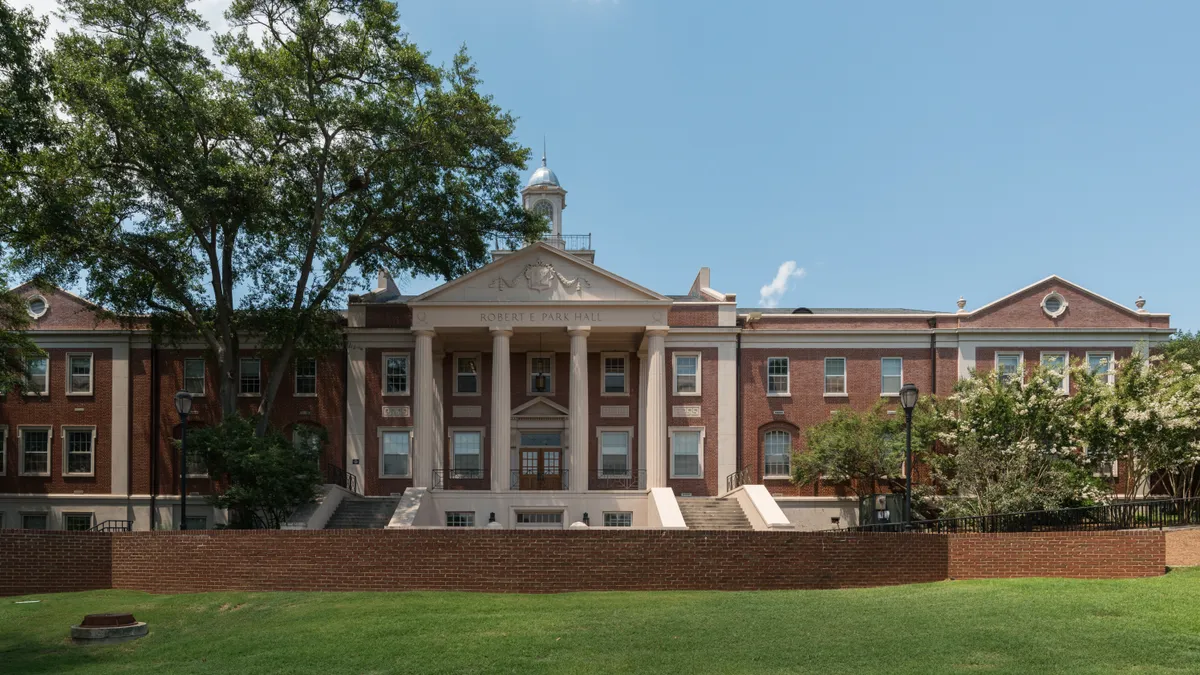Dive Brief:
- The U.S.'s most prominent college faculty association is threatening to censure the University System of Georgia if it does not reverse recent changes to tenure policies that the organization said flout academic freedom.
- The American Association of University Professors, which early on opposed the new rules, released a report Wednesday further explaining how it says the system violated tenets of shared governance and academic due process. AAUP largely focused on how the new policies would permit officials to fire poorly-performing tenured professors without an adjudicative hearing before a faculty body.
- USG Acting Chancellor Teresa MacCartney wrote in a letter acknowledging the report that she "wholly and strongly" disagrees with its conclusions. Faculty would have ample opportunity over several years to respond to alleged deficiencies in job performance, and forthcoming guidelines on the new policies may allow for the type of hearing AAUP is seeking, she wrote.
Dive Insight:
The system drew the AAUP's ire this fall when it proposed the tenure changes, which it argued would destroy the hallowed concept of tenure. Tenure exists to protect faculty from dismissal without cause, enabling them to research and present ideas that may be unpopular.
USG's move energized a nationwide debate about tenure protections. Critics of tenure say it could license professors with unsatisfactory work performance to keep their jobs without fear of reprisal.
Since USG adjusted its tenure policies in October, South Carolina lawmakers put forth a bill to abolish tenure systems in the state's public colleges. The AAUP has also condemned that proposed legislation.
The association, which announced an investigation into USG in late October, said in its new report that the system failed to meaningfully involve professors in developing the policies, constituting a shared governance violation. It also raised concerns about faculty being newly evaluated on a student success metric.
The danger in such a criterion lies in faculty potentially being judged on how they contribute to student retention, the AAUP report said. This could be measured with factors like grades, course-completion rates and student evaluations, which may not reflect actual teaching quality, it said.
Mostly, however, the organization objected to the system not authorizing hearings for tenured faculty to defend themselves after failing a job review.
Under the rules, faculty members would be granted such a hearing if they were being fired for violating a law or institutional policy, but not for poor job performance, the AAUP noted. It said that it studied 14 other public systems. Six maintained post-tenure reviews. None disregarded academic due process, according to the association.
"In removing tenure protections from the USG post-tenure review policy, the board of regents has sharply differentiated the University System of Georgia from its peer systems, but not in a manner that is likely to enhance its academic excellence, its reputation, or its competitive advantage," the AAUP report said.
MacCartney, in her letter to the AAUP, argued the new rules do not neuter academic freedom, but rather ensure professional growth and provide accountability. Most USG tenured faculty are "performing at a high level" but a small contingent are not fulfilling expectations "as judged by their peers," MacCartney wrote.
It's appropriate for the system to hold hearings to adjudicate alleged faculty crime or policy violations, which "may occur at a single point in time," MacCartney wrote. Conversely, post-tenure reviews are conducted over multiple years, she wrote.
"AAUP seems focused largely on the hearing panel and accompanying related procedures," she wrote. "USG is squarely focused on the development of every one of our faculty and the success of every one of our students."
A system spokesperson provided MacCartney's letter, dated this month, in response to Higher Ed Dive's request for comment on the AAUP report.
The AAUP said in a statement it would likely censure the system in 2022 if it did not "restore academic due process." The association's committee on academic freedom and tenure will recommend whether USG be censured based on the report's findings.










